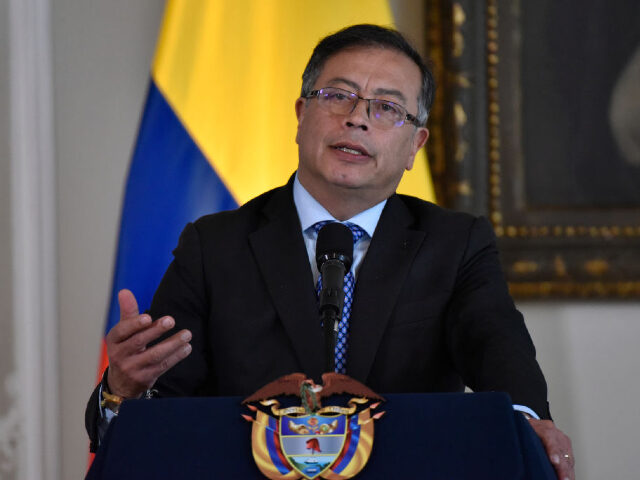Far-left President of Colombia Gustavo Petro said during a press conference with Secretary of State Antony Blinken in Bogotá on Monday that Temporary Protection Status (TPS) for Colombian nationals in America was “necessary” in anticipation of a global “exodus” allegedly caused by climate change.
Petro, the first leftist president in the history of Colombia, was holding his first meeting as president in Bogotá’s presidential palace with America’s top diplomat, discussing, among other issues, fighting cocaine trafficking and dealing with the ongoing Venezuelan migrant crisis. As a result of socialism, nearly 7 million Venezuelans have fled their country; Colombia has taken in more Venezuelan refugees than any other nation.
For much of the joint press conference with Blinken, Petro urged Washington to reconsider combatting international cocaine trafficking, at one point suggesting that drug criminals should not be extradited to the United States if they agree to be processed in the Colombian legal system.
Petro, who has vowed to destroy Colombia’s energy independence in the name of creating a “green” economy, also urged cooperation in developing alleged renewable energy sources.
As part of the visit, Petro gave Blinken a traditional Colombian garment known as a ruana as a gift.
“The Temporary Protection Status, which is a protection of migrants, is a democratic figure used by over a million people in Colombia,” Petro explained in the press conference in response to Blinken commending the country for offering TPS to Venezuelan refugees. “It was also used in Venezuela back in the ‘70s when Colombian migrants went to live in Venezuela.”
While suggesting he would review expanding privileges under TPS for Venezuelans in Colombia, Petro also appeared to request TPS for Colombians in the United States.
“Now, I do believe that a TPS for Colombians in the U.S. is also necessary. And I am not saying this by way of negotiation, because we have granted TPS to Venezuelans in Colombia – then we should have a TPS for Colombians in the U.S.,” Petro continued, “But I say this because this is, let’s say, the human law. In the conversation, we heard that a series of international events will take place, and the idea is to put order to the exodus that is produced by the climate crisis all over the world and is creating the creation of some very strange rights in the countries of the north.”
Petro later repeated that migration “is a world topic, a global topic that is becoming increasingly acute because of the climate crisis.”
Blinken did not directly address what appeared to be a request for TPS in the United States for Colombians. He instead spoke of the policy more broadly, applauding Colombia for offering TPS to Venezuelans and clarifying how the status should be used.
“When it comes to TPS, I would say simply that this is a – in our law, a very – a tool designed specifically to allow people to remain in the United States who are not able to go back to their countries of origin because of a crisis that is taking place in those countries,” Blinken said. “And that’s why, in the case of Venezuelans, we have temporary protected status for them, just as Colombia does, because they’re not able – given the crisis situation, the humanitarian catastrophe that is Venezuela, the horrific economic mismanagement as well as the political repression that exists – they simply can’t return. ”
“That’s what TPS is designed for. But more broadly, as I said, we’re looking at ways to increase legal pathways to the United States on either a long-term or temporary basis, and that would certainly include Colombians,” Blinken added.
Blinken stated that the administration of leftist President Joe Biden was, in general, attempting to increase the number of foreigners allowed into America.
“We’re working to expand legal pathways to come to the United States. We’re working on issuing more temporary work visas to meet a very clear demand in the United States,” Blinken said. “We’re making sure that we’re – when it comes to those who have a credible claim of asylum that we are meeting our responsibilities under international law, including by putting vast new resources at our border so that their claims can be adjudicated much more quickly than in the past.”
According to U.S. Citizenship and Immigration Services (USCIS), TPS certification is offered to citizens of countries where the circumstances on the ground “temporarily prevent the country’s nationals from returning safely, or in certain circumstances, where the country is unable to handle the return of its nationals adequately.”
Among the examples of situations that create a cause for TPS status listed on the USCIS website are “ongoing armed conflict,” “environmental disaster,” or “other extraordinary and temporary conditions.” Colombia is not currently experiencing armed conflict or war, has not suffered any environmental disaster, and does not overtly appear to meet any of the conditions for TPS. In contrast to the peaceful, democratic living situation in Colombia, the list of 15 countries currently receiving TPS from Washington includes Ukraine, Yemen, and Afghanistan. In Latin America, citizens from El Salvador, Honduras, Haiti, Nicaragua, and Venezuela all receive TPS for various reasons, from earthquake damage (Haiti) to socialism (Venezuela).

COMMENTS
Please let us know if you're having issues with commenting.